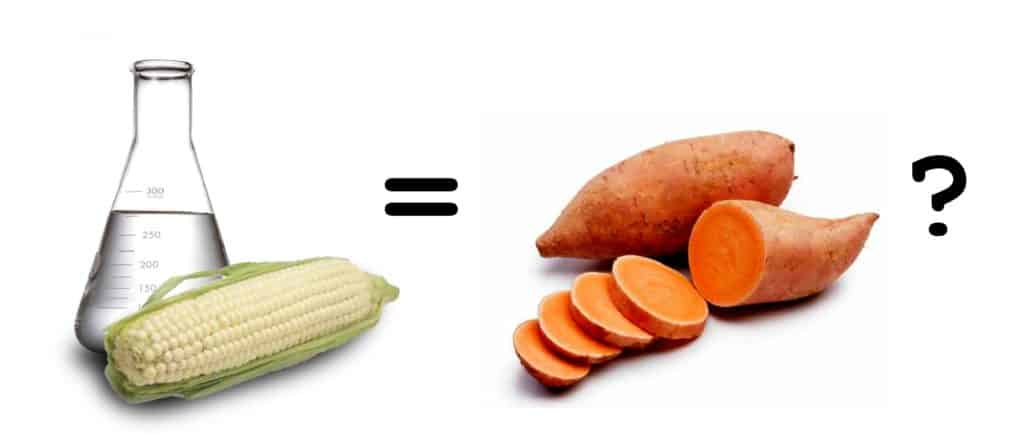Many RDs and clinicians ask us if Liquid hope is suitable for those with diabetes. Absolutely. I think the question is asked so frequently because Liquid Hope does not state anywhere on its package or in its literature that it is designed specifically for diabetes. In contrast, descriptions of commercial formulas such as Glucerna 1.2 and Diabetisource AC 1.2 contain language that clearly delineates them from other formulas. They are apparently formulated specific to the condition of diabetes and contain the appropriate ingredients and nutritional qualities. Really? Let’s take a closer look at what they are and what’s in them:
FIRST INGREDIENTS
Diabetisource AC 1.2: water, corn syrup, soy protein isolate, canola oil
Glucerna 1.2: water, sodium caseinate, corn maltodextrin, safflower oil
CARBOHYDRATES per 1200 kcal and Primary/Leading Source of Carbohydrate
Diabetisource AC 1.2: 100g, corn syrup
Glucerna 1.2: 114.1g, corn maltodextrin
NET CARBOHYDRATES (Total Carbohydrates-Fiber) per 1200kcal
Diabetisource AC 1.2: 85g net carbohydrate
Glucerna 1.2: 98g net carbohydrate
SUGAR CONTENT: Neither formula makes this available in their nutritional information!
What’s most striking about both of these popular diabetes formulas is the use of highly refined sources of carbohydrate for the bulk of their ingredients. This may be why the sugar content is not made available. There is also a myth that has persisted for the past few decades that added sugar doesn’t matter, that it doesn’t really influence a person’s risk of developing diabetes, nor the management of diabetes. Really? Let’s take a closer look at what the literature indicates. In my opinion, most commercial enteral formulas are sugar-sweetened beverages. A diabetes-specific formula sweetened with corn syrup isn’t that different.
Deshpande G, Mapanga RF, Essop MF. Frequent Sugar-Sweetened Beverage Consumption and the Onset of Cardiometabolic Diseases: Cause for Concern? Journal of the Endocrine Society. 2017;1(11):1372-1385. doi:10.1210/js.2017-00262.
In this meta-analysis, the authors conclude: “The analysis revealed that most epidemiological studies strongly show that frequent SSB intake contributes to the onset of the MetS in the longer term. Some of the findings also show that regular SSB intake can alter glucose handling and insulin sensitivity, thereby contributing to the development of the MetS and T2DM. There is also evidence that frequent SSB intake (and particularly fructose) is linked to hypertension and well-known cardiovascular disease risk factors.”
(SSB-sugar sweetened beverages, MetS-metabolic syndrome T2DM-Type 2 diabetes mellitus)
Schwingshackl L, Hoffmann G, Lampousi A-M, et al. Food groups and risk of type 2 diabetes mellitus: a systematic review and meta-analysis of prospective studies. European Journal of Epidemiology. 2017;32(5):363-375. doi:10.1007/s10654-017-0246-y.
The authors state: “shows an increase of risk of T2D throughout all the range of SSB investigated”
(SSB-sugar sweetened beverages)
Ma J, Jacques PF, Meigs JB, et al. Sugar-Sweetened Beverage but Not Diet Soda Consumption Is Positively Associated with Progression of Insulin Resistance and Prediabetes. The Journal of Nutrition. 2016;146(12):2544-2550. doi:10.3945/jn.116.234047.
RESULTS: “After adjustment for multiple potential confounders, including baseline BMI, we observed that SSB intake was positively associated with incident prediabetes (P-trend < 0.001); the highest SSB consumers (>3 servings/wk; median: 6 servings/wk) had a 46% higher risk of developing prediabetes than did the SSB nonconsumers”
These are just three of the more recent investigations examining how added sugar, in beverages and primarily from corn syrup, influence both the risk of developing and the progression of diabetes. There are many others before them.
In comparison, Liquid Hope contains no added sugar. It was developed as a healthy meal replacement to help people of almost all metabolic conditions.
Here are its four top ingredients, leading sources of carbohydrate, and nutritional qualities as they relate to the management of diabetes. Yes, we think it is a great fit for those with diabetes and we would put it up against these aforementioned enteral formulas, supposedly the best, anytime.
- INGREDIENTS, in decreasing order: filtered water, organic garbanzo beans, organic green peas, organic carrots, organic whole grain brown rice, organic whole grain brown rice protein, organic flax oil, organic sprouted quinoa, organic sweet potato, organic broccoli, organic almond butter, organic kale, organic garlic, organic turmeric, organic rosemary, organic ginger, organic wakame (seaweed).
- CARBOHYDRATES per 1200kcal and Primary/Leading Source: 130g, garbanzo beans
- NET CARBOHYDRATES per 1200kcal: 106g
- SUGAR CONTENT: 9g per pouch, from organic peas and carrots
~ John Bagnulo MPH, PhD.
